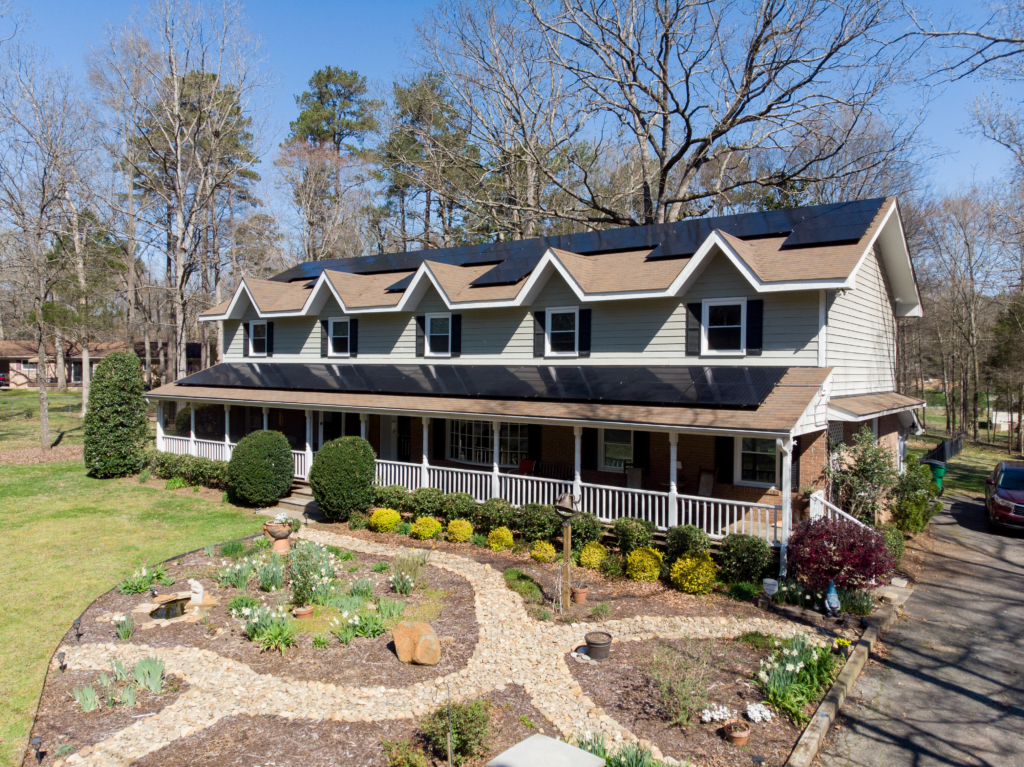Home Value When You Go Solar
Home Value When You Go Solar
What happens to your home value when you go solar? When choosing to go solar our customers come to us with questions such as how going solar can benefit them overtime. There are numerous benefits to going solar such as lower electric bills, lower carbon footprints, and potentially higher home values. Just like when you renovate a kitchen or a finished basement, going solar increases your homes overall value as it is viewed as an upgrade.
Studies show that homes with solar panels sell faster than homes that do not and buyers would even pay a premium of $15,000 for a home with an average-sized solar array.
For example, here at Renu, our employees believe in what we do! John Sheldon was able to sell his previous home for over 3% in appraised value due to the solar system he had installed.
When wanting to invest in solar, we can guarantee that going solar is a safe investment and will benefit you long-term.
Look Forward to a Great Experience
Homeowners like you are choosing to own their power because it’s a smart, safe financial investment. Renu Energy Solutions is a top rated solar company across the Carolinas. Keep reading to learn about some of our $0 up front financing options to make sure you get the best savings for your new solar system from day one.
It is also good to mention that we also offer home solar financing options!
Home solar financing options are designed so that our customers can receive their tax incentives from the federal and state governments before paying out of pocket for their new system
9 out of 10 homeowners are choosing to have solar and energy storage installed with $0 upfront cost. Unlike leases, our home solar financing options allow you to own your own power and energy storage system. Our solar loans are designed in a way that allows you to take advantage of any tax incentives from the Federal and State governments. We can help you find the best financial option to fit your individual needs to help with the paying for the cost of your solar system. We offer a wide variety of finance options that are extremely competitive with traditional loans. Renu makes owning your power more affordable today, tomorrow, and decades to come!
Residential Solar Energy Financing Options
Same-as-Cash Consumer Financing
This no money out of pocket option allows homeowners to have zero interest and zero minimum monthly payments while immediately receiving benefits from clean, reliable solar energy and utility savings. Once your system is paid for there’s no monthly payment, just free power that can last for decades.
Long and Short Term Financing Options Available
With no money upfront out of pocket, we structure these loans to replace the utility bill so most customers’ solar payment is usually the same or lower than their current electric bill. Every dollar of the fixed monthly solar payment goes towards owning the system. There’s no prepayment penalty and the loan is completely transferable to a new home buyer to pick up where the prior homeowner left off. Another benefit of solar is increase home value.
Home Equity Lines of Credit (HELOC)
Many customers choose to finance their solar investments with home equity loans. With interest rates as low as they are and all the savings you’ll realize on utility costs, this is a great option for any homeowner. We have many customers that use the 12 months same as cash option, then apply their tax credits to that loan, followed by paying the remaining of the costs via their home equity line of credit and leveraging the savings from their utility bill to pay off that line of credit.

Frequently Asked Questions About Solar for Your Home:
How exactly does going solar and a solar system itself work?
How many solar panels do I need for my home?
Roof-size/available space: When we look at the size of your roof and the space available, we gather data that tell us the maximum number of solar panels your home or site can hold and we even consider shading. We use a software “Suneye” which takes a 360 picture of your roof and we use this photo to determine if your home is a good candidate for solar.
Energy Usage: When we determine energy usage we look at your past electrical bills from over the course of a year to make sure your system isn’t too big or too small.
Your Budget: We take your budget seriously and most importantly, we want you to be satisfied with our services. We take your feedback on how much you want to spend so that we can size your system appropriately.
What is solar net-metering?
Does Duke Energy offer net-metering?
Curious about the cost of a home solar system?
Ready to Own Your Own Energy?
Speak to Us Today!
